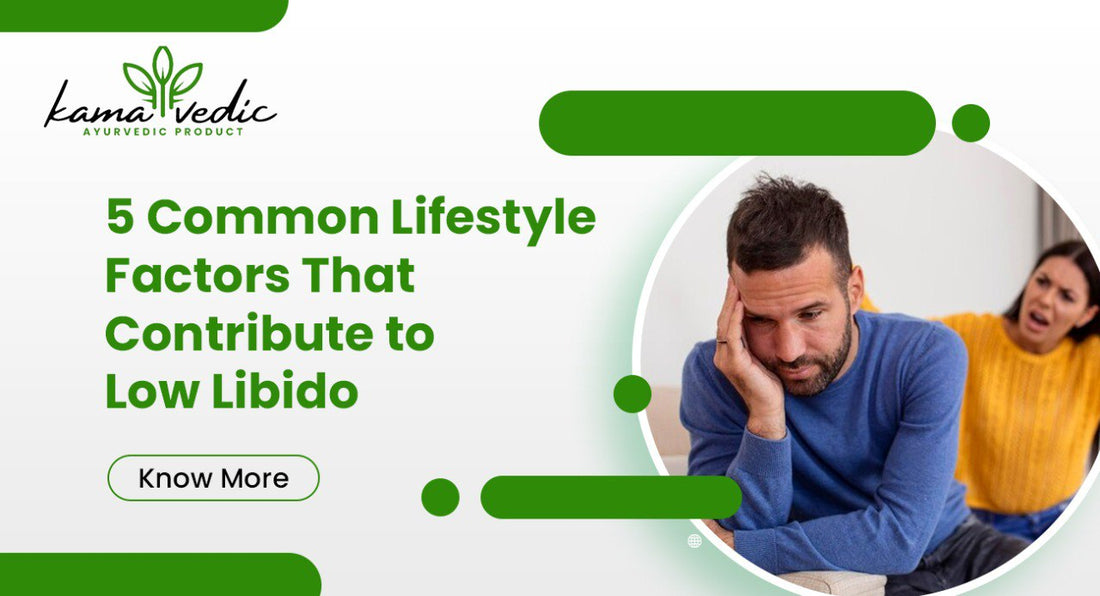
Low libido can be a frustrating and concerning issue for many, but it’s often linked to lifestyle choices we make daily. While medical conditions can certainly play a role, several everyday habits can also contribute to a decline in desire and energy levels. Understanding these lifestyle factors can help in making better choices to improve overall well-being and vitality.
Here are five common lifestyle factors that can contribute to low libido and how they affect your overall health.
1. Chronic Stress
Stress is a part of life, but when it becomes chronic, it can take a significant toll on your body and mind. High levels of stress lead to increased production of cortisol, a hormone that, over time, can disrupt the balance of other hormones responsible for maintaining energy and motivation. When the body is constantly in a state of stress, it's hard to find the mental or physical energy for anything beyond coping with immediate demands. Managing stress through relaxation techniques, mindfulness, or even light exercise can help bring balance back to your life.
2. Poor Diet
The food you consume has a direct impact on your energy levels and overall health. A diet high in processed foods, unhealthy fats, and sugar can lead to weight gain, fatigue, and reduced motivation. Nutrient deficiencies, particularly in vitamins and minerals like zinc and magnesium, can also affect your body’s ability to maintain hormonal balance. Incorporating a balanced diet rich in fruits, vegetables, lean proteins, and whole grains can boost energy levels and support overall health, which may, in turn, improve your vitality.
3. Lack of Physical Activity
A sedentary lifestyle is one of the major contributors to low energy levels. Regular exercise is not only essential for maintaining physical fitness but also plays a key role in boosting mood and improving circulation. Physical activity increases the production of endorphins, often referred to as "feel-good" hormones, which can improve mood and overall motivation. Whether it’s a brisk walk, yoga, or strength training, finding a form of exercise you enjoy can help increase your energy levels and overall sense of well-being.
4. Sleep Deprivation
Sleep is crucial for both physical and mental health. When you’re not getting enough rest, your body struggles to recover and maintain normal functions, leading to fatigue and reduced motivation. Over time, sleep deprivation can negatively affect hormone production and energy levels. Prioritizing sleep by establishing a consistent bedtime routine, creating a restful environment, and limiting screen time before bed can help ensure you get the quality rest your body needs to function at its best.
5. Excessive Alcohol Consumption
While having an occasional drink is fine, excessive alcohol consumption can interfere with the body’s natural hormone balance. Alcohol acts as a depressant, affecting mood, energy, and overall vitality. Additionally, overconsumption of alcohol can disrupt sleep, impair judgment, and lead to unhealthy lifestyle choices, all of which can contribute to low energy and reduced motivation. Moderation is key when it comes to alcohol, and cutting back can significantly improve both mental and physical health.
Conclusion
Low libido is often a result of the everyday choices we make, and understanding the connection between lifestyle habits and well-being is essential for improving energy levels and overall vitality. By managing stress, adopting a healthy diet, staying physically active, prioritizing sleep, and moderating alcohol intake, you can make positive changes that support your body’s natural balance.
Making these small yet significant changes in your lifestyle can lead to improved overall health and a renewed sense of energy, helping you feel more balanced and motivated in all areas of life.

